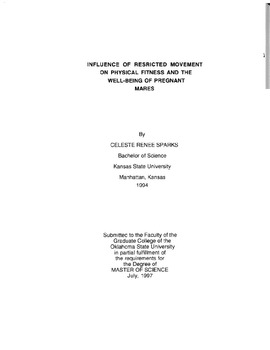| dc.description.abstract | The Pregnant Mare Urine (PMU) farms have recently been under scrutiny by animal right's activists due to extended periods of confinement these mares are subjected. These activists have stated that mares' fitness decreases throughout the urine collection periods on these farms. The well-being of the mares on PMU farms is monitored by company field representatives whom inspect the farms monthly (Jones 1996), and and also by compliance to a code of practice. This Recommended Code of Practice for PMU farms, section 4.6, states, "All horses on a PMU farm should be provided with as much exercise as is necessary for their welfare. u To date, there is no data available to define the exercise requirement for horses. A variety of exercise programs are established at individual PMU farms. Some mares are turned out every 4-5 days, some more frequently, and some mares are not exercised for the whole collection period, approximately 5-6 months. It has been noted that a few mares became agitated when initially removed from their tie stalls and allowed exercise, which indicates that removing these mares from their daily routine may be a source of behavioral stress (Coleman, personal communication). The North American Equine Ranching Information Council (NAERIC) conducted a survey in 1994 of 387 PMU ranches in Canada and North Dakota (NAERIC 1994). This survey was conducted to determine the extent of exercise programs utilized under current PMU management practices. Results indicated that 97.7% of the PMU farms have established exercise programs in which mares are exercised an average of six days per month. The remaining 2.3 % either did not respond to the surveyor do not have established exercise programs. Seventy six percent of the farms, with exercise regimens, alter their exercise programs to meet the behavioral needs of each horse, and the remaining 21 % of the PMU farms indicated established exercise programs with standard levels for the entire herd. Fitness is defined by Stedman's/Webster's New World Medical Dictionary (1987) as suitability or well-being. These mares that are utilized during urine collection periods are suitable for the PMU farms because they are �fit" to carry their foal to term. The majority of PMU farms exercise their mares during urine collection periods, however there is no defined exercise requirement for horses. The objective of this study was to determine the effects of extended periods of restricted movement on response of mares to aerobic exercise and to begin to establish guidelines for exercise in mares housed under current PMU conditions. | |
